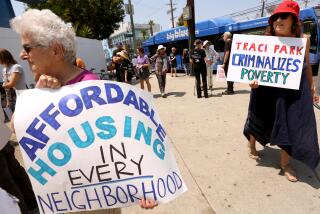L.A.’s homeless and their stuff
The U.S. 9th Circuit Court of Appeals on Wednesday upheld a lower court’s order barring Los Angeles sanitation officials from seizing or destroying the unattended property of homeless people who live in downtown’s skid row. We hope that City Atty. Carmen Trutanich will accept the ruling and abandon his misguided legal battle.
Trutanich has spent more than a year arguing that a city ordinance authorizes the Bureau of Street Services and police to remove and destroy property that has been left unattended on city streets, even for a short time. But his arguments make no legal or practical sense — and have been repeatedly rejected by courts.
No one denies that the city has a right to keep the streets clean or that police and sanitation workers have the right to confiscate those items that pose a true danger to public safety or health. But as the three-judge panel of the 9th Circuit Court noted, Trutanich’s logic would allow police to seize and destroy a car parked momentarily in a no-parking zone or a dog left alone on a corner. His argument that the homeless are using the sidewalks as their own personal storage areas — something that other city residents aren’t permitted to do — may be true, but by definition the homeless have nowhere else to store their belongings when they leave briefly to eat, shower or meet with a social worker. And as shabby as those belongings may sometimes look, they often include important personal possessions, such as identification, medication, family photographs, cellphones or sleeping bags.
PHOTOS: Cleanup effort on skid row
The simple fact is that under the 4th Amendment, individuals — whether they live on the street or in a home — are protected from unreasonable seizure of their property, and no local ordinance can trump that protection.
Trutanich says his goal is to protect public health and safety and guarantee that sanitation workers can carry out routine street cleaning. A far more productive strategy for keeping the streets clean and safe — and one that would be in line with the court’s insistence on due process — would be for officials to expand a project started this summer in which advocates alerted people living on the street of impending cleanups and the city provided temporary storage of any items removed. One 13-day sweep succeeded in removing nearly five tons of trash while providing hundreds more homeless people with a way to temporarily store their belongings in a nearby warehouse.
Surely the city of Los Angeles can find a balance between the need to keep its streets clean and safe and the rights of homeless people to hold on to their belongings without wasting time and money on futile litigation.
More to Read
A cure for the common opinion
Get thought-provoking perspectives with our weekly newsletter.
You may occasionally receive promotional content from the Los Angeles Times.










